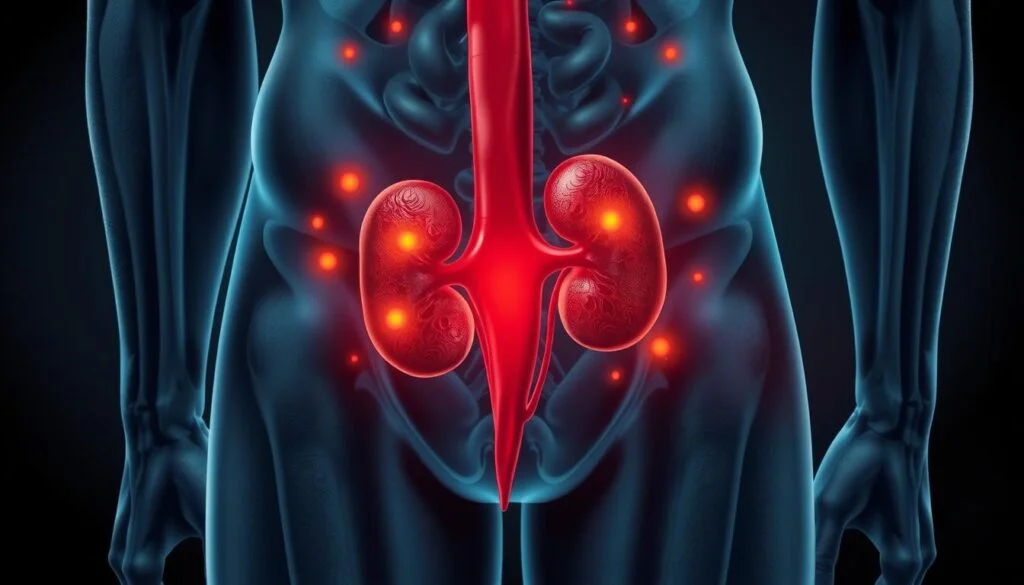Dark urine could indicate a liver problem – Health Guide
The color of your urine can tell a lot about your health, especially your liver. Dark urine might mean your liver is not working right. This guide will help you understand why dark urine could be a sign of liver problems. We’ll look at the causes, symptoms, and when you should see a doctor.

Key Takeaways
- Dark urine can be a sign of a liver problem, as it may indicate high bilirubin levels in the body.
- Urine color can vary throughout the day, but persistent dark urine should be addressed.
- Certain liver conditions, such as hepatitis, cirrhosis, and liver cancer, can cause changes in urine color.
- Dehydration and certain medications can also contribute to dark urine, so it’s important to consider other factors.
- Seeking medical attention is recommended if you notice persistent dark urine, as it may require further investigation and treatment.
Understanding Normal vs. Abnormal Urine Color
The color of our urine can tell us a lot about our health. Knowing what’s normal and when to worry can help spot health issues early.
Typical Urine Color Variations Throughout the Day
Urine color changes throughout the day. It depends on how much water we drink, what we eat, and our meds. Lighter colors mean we’re well-hydrated, while darker colors suggest we need more water.
- Pale yellow: This is the ideal urine color, reflecting proper hydration levels.
- Bright yellow: This may be caused by certain vitamins or medications, such as riboflavin or B-complex supplements.
- Dark amber or honey-colored: This typically indicates dehydration and the need for increased fluid intake.
When to Be Concerned About Urine Color Changes
Minor changes in urine color are usually okay. But big or lasting changes should make you think twice and see a doctor. Some colors that might mean trouble include:
- Bright red or pink: This can be a sign of blood in the urine, potentially due to a urinary tract infection, kidney stones, or other underlying conditions.
- Dark brown or tea-colored: This may indicate a liver problem, as the buildup of bilirubin can cause the urine to appear darker.
- Cloudy or murky: This could signify a urinary tract infection or the presence of bacteria, white blood cells, or other particles in the urine.
If your urine color keeps changing or looks odd, see your doctor. They can check it out and help if needed.
Dark Urine Could Indicate a Liver Problem: Key Warning Signs
Noticing your urine is darker than usual is a sign you should not ignore. Dark urine can hint at liver issues, a key organ for many body functions. Spotting these signs early can help you take care of your health.
Jaudice, a yellowish skin and eye discoloration, is a common sign of liver trouble. It happens when the liver can’t break down bilirubin, a byproduct of red blood cell breakdown.
- Abdominal pain, especially in the upper right, can also point to liver problems.
- Fatigue and unexpected weight loss are other signs that may mean liver issues.
- Sometimes, people might feel nauseous, vomit, or lose their appetite.
If you’re seeing dark urine and any of these symptoms, see a doctor. They can run tests to find out what’s wrong and help you get better.
Acting fast to treat liver problems can make a big difference. By watching your urine color and getting medical help when needed, you can protect your health.
The Link Between Liver Function and Urine Color
Your liver is key to keeping your urine healthy and looking right. It breaks down substances, including bilirubin. This pigment comes from breaking down red blood cells and affects urine color.
How Bilirubin Affects Urine Appearance
When your liver works well, it clears bilirubin from your body. But, if liver function is impaired, bilirubin builds up. This makes your urine darker, from yellow to brownish-orange.
Common Liver Conditions Affecting Urine Color
- Hepatitis: Viral infections like hepatitis A, B, or C can cause inflammation. This leads to more bilirubin levels and darker urine.
- Cirrhosis: This chronic disease scars the liver and hampers its function. It affects how bilirubin is processed.
- Liver cancer: Tumors or cancers in the liver disrupt its function. This can lead to liver disease and changes in urine color.
The Role of Liver Enzymes
Liver enzymes like ALT and AST also show liver health. High levels can mean liver damage or dysfunction. This can change your urine’s appearance.
“Maintaining a healthy liver is crucial for overall well-being, and monitoring changes in urine color can be a valuable indicator of potential liver problems.”
Other Medical Conditions That Cause Dark Urine
Liver problems are a common reason for dark urine. But, other medical conditions can also cause this symptom. For example, urinary tract infections, kidney stones, and rhabdomyolysis can lead to discolored urine.
Urinary tract infections (UTIs) can make urine cloudy, dark, or even bloody. This is because of bacteria, white blood cells, and red blood cells in the urine. UTIs are more common in women but can happen to anyone.
Kidney stones can also make urine dark. These small, hard mineral deposits in the kidneys can block urine flow. This leads to changes in urine color and appearance.
Rhabdomyolysis is a serious condition where muscle tissue breaks down quickly. This releases a protein called myoglobin into the bloodstream. The kidneys filter this myoglobin, making urine dark and cola-like.
| Condition | Impact on Urine Color |
|---|---|
| Urinary Tract Infection (UTI) | Cloudy, dark, or bloody urine |
| Kidney Stones | Dark, discolored urine |
| Rhabdomyolysis | Dark, cola-colored urine |
Remember, these conditions are not the only reasons for dark urine. If you notice changes in urine color, see a healthcare professional. They can diagnose and treat the issue properly.

Dehydration and Its Impact on Urine Color
Dehydration can change the color of your urine. If you don’t drink enough water, your body makes urine more concentrated. This makes it darker yellow or amber.
Hydration Guidelines for Healthy Urine
Drinking lots of water is key to keeping your urine healthy. The amount you should drink varies. It depends on your age, how active you are, and your health. A good rule of thumb is to drink about 11.5 cups (2.7 liters) if you’re a woman. Men should aim for 15.5 cups (3.7 liters).
Signs of Severe Dehydration
- Persistent dark yellow or amber-colored urine
- Decreased urine output or infrequent urination
- Dry mouth and lips
- Fatigue and dizziness
- Rapid heart rate
- Confusion or disorientation
If you see these signs, get medical help fast. Severe dehydration can cause serious health problems if not treated.
| Urine Color | Hydration Level |
|---|---|
| Pale yellow | Well-hydrated |
| Dark yellow | Slightly dehydrated |
| Amber or honey-colored | Dehydrated |
| Brown or tea-colored | Severely dehydrated |
Keeping yourself hydrated and watching your urine color is crucial. Knowing how dehydration affects your body helps you stay healthy. Aim for a pale yellow urine color by drinking enough water.
Medications That May Affect Urine Color
Some medications and supplements can change the color of your urine. These changes can be harmless or serious. Knowing about these changes can help you know when to see a doctor.
Antibiotics like rifampin often make urine dark. It turns urine a reddish-orange color. Drugs like primaquine for malaria and senna for laxative also change urine color.
Food dyes in some medicines, like those for urinary infections, can make urine look bluish or greenish. Vitamins, like riboflavin (vitamin B2), can make urine bright yellow or glow.
| Medication | Urine Color Change |
|---|---|
| Rifampin (antibiotic) | Reddish-orange |
| Primaquine (antimalarial) | Reddish-brown |
| Senna (laxative) | Reddish-brown |
| Medications with food dyes | Bluish, greenish |
| Riboflavin (vitamin B2) | Bright yellow, fluorescent |
While most urine color changes from medicines are safe, they can hide signs of serious health issues. If your urine color keeps changing or you’re worried, talk to your doctor. They can find out why it’s happening.

When to Seek Medical Attention
Dark urine can be a worrying sign, often pointing to a health issue that needs quick action. If your urine color has changed and stays that way, it’s time to see a doctor. Here are some signs that mean you should go to the hospital right away:
- Sudden or unexplained dark urine that lasts more than a couple of days
- Dark urine with other symptoms like belly pain, feeling sick, throwing up, or yellow skin and eyes
- Dark urine with fever, chills, or feeling very tired, which could mean a serious infection
- Dark urine with not much urine coming out, which might mean you’re dehydrated or have a serious kidney or liver issue
If you notice any of these symptoms, you should get medical attention fast. Quick diagnosis and treatment are key to fixing liver problems or other health issues causing dark urine. Your doctor will check you, run tests, and find the right treatment to help you get better.
“Ignoring dark urine can lead to serious complications if the underlying cause is not addressed in a timely manner.”
Your health is the most important thing. If you’re worried about your urine color or other symptoms, call your doctor. Getting help early can really help fix any liver problem or other health issue.
Prevention and Lifestyle Changes
Keeping your liver healthy is key for your overall well-being. There are many steps you can take to prevent liver problems and keep your urine color right. By making these lifestyle changes and following dietary recommendations, you can take control of your health and avoid liver issues.
Daily Habits for Liver Health
Healthy daily habits can greatly help your liver. Regular exercise, like moderate activity, supports liver function and boosts overall health. Stress management, through meditation or yoga, also helps reduce stress’s impact on the liver.
Dietary Recommendations
Your diet is vital for liver health. Eating a balanced diet with whole, unprocessed foods supports liver function. Include foods rich in antioxidants, like fruits, veggies, and green tea, to aid in detoxification. Also, cut down on alcohol, processed meats, and sugary or high-fat foods to keep your liver healthy and prevent urine discoloration.
FAQ
What are the main causes of dark urine?
Dark urine can come from many sources. These include liver issues, dehydration, and urinary tract infections. Kidney stones, rhabdomyolysis, certain meds, and some food dyes also play a role.
How is dark urine related to liver problems?
Liver problems can make urine dark. The liver helps get rid of bilirubin, a product of broken-down red blood cells. Too much bilirubin can turn urine dark yellow, amber, or brown.
What other medical conditions can cause dark urine?
Dark urine can also signal urinary tract infections, kidney stones, or rhabdomyolysis. It might also be a sign of certain medications or supplements.
How does dehydration affect urine color?
Dehydration makes urine darker. This is because the body tries to save water. Drinking enough water is key to keeping urine the right color.
What medications or substances can lead to changes in urine color?
Some meds, like antibiotics and vitamins, can change urine color. Even some food dyes can do this. Knowing side effects of your meds is important.
When should I seek medical attention for dark urine?
See a doctor if your urine stays dark, especially with pain, jaundice, or tiredness. Quick medical check-ups are crucial for finding and treating the cause.






Post Comment